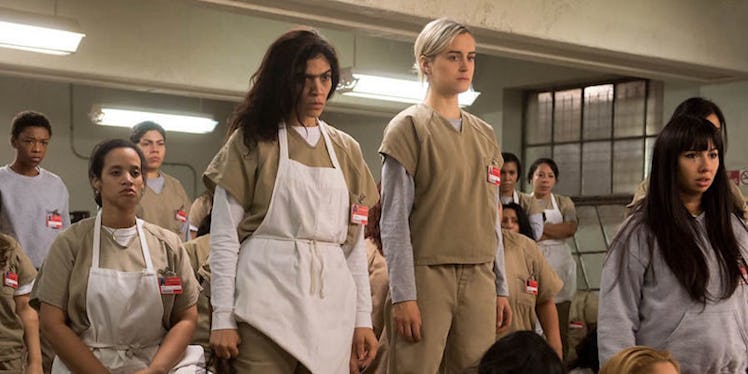
The Big Spoiler In 'OITNB' Season 4 Is Not Just Problematic, It's Also Bad TV
MAJOR MEGA SPOILER WARNING: Do not read this if you don't want to be spoiled for the last two episodes of "Orange Is the New Black" Season 4.
If you're still reading this article, you've probably finished watching the newest season of "Orange Is the New Black," which means you know the big spoiler: Poussey is killed off — choked to death by CO Bayley who was trying to "restrain" her.
Plainly put, the decision to kill Poussey Washington sucks, on so many levels.
In a way, I sort of see what show runner Jenji Kohan and the other writers were trying to do — or at least, what they undoubtedly will say they were trying to do.
Poussey's death echoes the murder of Eric Garner, the unarmed 43-year-old black man who was choked to death by a police officer for allegedly selling cigarettes. It (sort of) gets into the Black Lives Matter movement.
In theory, her death is a harsh wake-up call to the reality of prison, racism and police brutality. In practice, it's irresponsible, exploitive and, frankly, not a smart business or creative move.
Many black fans of the show have already criticized the plot line for its sympathetic approach to Poussey's killer and for falling into the trope of killing off minority characters.
(Note: If anyone has found any good think pieces from black writers, please them send my way. For now, the incredibly smart discourse on Black Tumblr makes my job much easier.)
I am white so I won't speak any more on whether or not the racial implications surrounding Poussey's death were handled well by the show. That's not my place.
What I will talk about is this: Killing off Poussey makes for bad television. Plain and simple.
Her death does nothing for the show in the long run, besides deprive it of its most interesting and charismatic character.
Poussey brought a much needed balance to every scene she was in. Her refreshing sincerity and goodness countered the tiresome anti-hero trope that so many of the other characters fall into again and again. (See: Piper.)
And her intelligence set her apart from the good-but-dumb trope the other non-anti-hero characters take up. (See: Suzanne.)
There's a reason most dramas are reluctant to kill of main characters. It's just not smart writing. Jenji Kohan and her writers just closed a hundred doors that can never be opened again.
It does little for the show in the short run, either, other than squeeze some shock value and easy tears out of viewers. So many amazing storylines were flushed down the drain for that.
Moreover, this death is cruel, to both the fans and the actors.
In an interview with The New York Times, it is clear actress Samira Wiley, though she remains poised and gracious, had no interest in leaving "Orange Is the New Black."
And why should she? She was clearly one of the stand-out actors of the ensemble, and the writers knew that.
In the interview, Wiley said,
I heard from some of the writers that they couldn't necessarily do this with every character. That it had to be a character that people really loved and people really cared about — I'm sorry [starts to cry].
Lauren Morelli, who wrote the death episode (and who also happens to be dating Wiley), was also part of that interview. Morelli went on to add,
Jenji made a point that has really stuck with me, and that I've used as my centering device throughout the season — and that is, whatever character we chose, she wanted it to feel like that character had a future on the outside of prison ahead of them, so that the loss of that future would really be felt. Her point was that would be most clearly seen through Poussey, which I completely agree with.
In other words, Kohan was well aware Poussey was a fan favorite, probably because many young, queer WOC told her how much the character meant to them.
Kohan then took that information and used it to break the hearts of those fans by snatching away from them one of the few characters they can see themselves in.
That's not good TV, that's just cruelty.
As a queer (though again, white) fan, I was not entertained. I was not brought on a satisfying emotional journey. I was just frustrated and angry. I felt betrayed by a show I had trusted and invested so much time in.
Don't get me wrong — the fourth season of "Orange Is the New Black" was amazing in many ways.
We saw Suzanne grow into a more sophisticated character than Season 1 "Crazy Eyes" could dream of, we got Nicky back in flying colors and we got an unexpected but effectively touching relationship between Taystee and Caputo.
Poussey's death doesn't negate those accomplishments, but it does taint them for me.
At this point, I'm not sure if I'll return to the show next year or not. Maybe I'll check out Samira Wiley in "You're the Worst" instead.